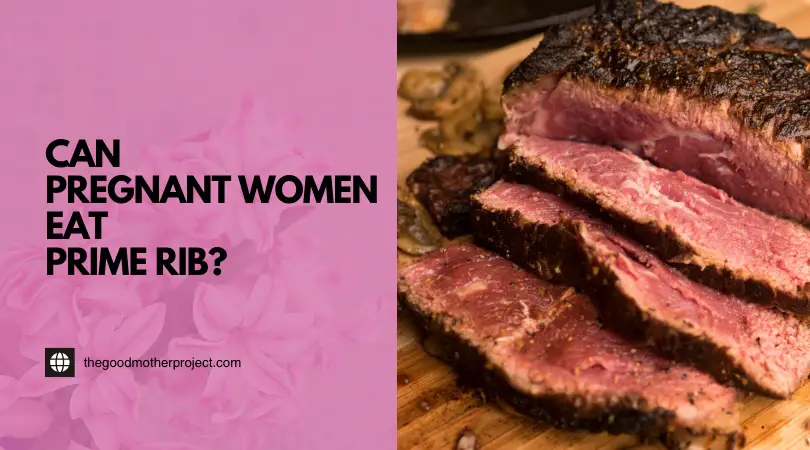Last Updated on January 6, 2025
Pregnant women should avoid eating prime rib due to the risk of undercooked meat and potential bacteria. It’s best to choose fully cooked options for safety.
Prime rib, a favorite for many, often raises questions for pregnant women. The appeal of its rich flavor and tenderness can be hard to resist. However, pregnancy requires special dietary considerations to ensure both mother and baby stay healthy. Undercooked or raw meats can harbor harmful bacteria like Listeria and Salmonella, which pose serious health risks during pregnancy.
Pregnant women need to prioritize food safety to avoid complications. Opting for well-cooked meats helps minimize these risks while still allowing for enjoyable meals. Understanding safe food choices during pregnancy can make dining out or cooking at home more enjoyable and safe.
Safety Concerns With Prime Rib During Pregnancy
Pregnancy brings many dietary choices into focus. Prime rib can be a tempting option. However, safety is vital. Understanding potential risks is essential for a healthy pregnancy.
Bacterial Risks
Prime rib can carry harmful bacteria. These bacteria can lead to serious infections. Two main concerns are:
- Salmonella: Found in undercooked meat. It can cause severe gastrointestinal issues.
- Listeria: Can grow in deli meats and undercooked beef. It poses risks to both mother and baby.
Pregnant women should avoid raw or undercooked prime rib. Cooking meat properly reduces these risks. Always ensure proper hygiene when handling raw meat.
Recommended Cooking Levels
Cooking prime rib to the right temperature is crucial. Here are the safe cooking levels:
| Cooking Level | Internal Temperature |
|---|---|
| Rare | 125°F (52°C) |
| Medium Rare | 135°F (57°C) |
| Medium | 145°F (63°C) |
| Medium Well | 150°F (66°C) |
| Well Done | 160°F (71°C) |
For pregnant women, aim for at least 160°F. This ensures all harmful bacteria are killed. Safe cooking is the best way to enjoy prime rib without worry.
Nutritional Benefits Of Prime Rib For Pregnant Women
Prime rib offers several nutritional benefits for pregnant women. It is rich in essential nutrients. These nutrients support both the mother and the developing baby. Let’s explore the key benefits.
Iron Content
Prime rib is an excellent source of iron. Iron plays a crucial role during pregnancy.
- Helps make more blood for the mother.
- Supports the baby’s growth.
- Prevents anemia in pregnant women.
Here’s a quick look at the iron content in prime rib:
| Serving Size | Iron Content (mg) |
|---|---|
| 3 oz | 2.1 mg |
| 6 oz | 4.2 mg |
Protein Supply
Prime rib is packed with high-quality protein. Protein is vital during pregnancy for many reasons.
- Supports tissue growth for the baby.
- Helps build muscles for the mother.
- Boosts overall energy levels.
Each serving of prime rib provides a significant amount of protein:
| Serving Size | Protein Content (g) |
|---|---|
| 3 oz | 22 g |
| 6 oz | 44 g |
Eating prime rib can help meet daily protein needs.
Tips For Eating Prime Rib Safely While Pregnant
Enjoying prime rib during pregnancy can be safe with some precautions. Follow these tips to ensure both taste and safety.
Choosing Quality Meat
Selecting the best prime rib is essential for safety. Here are some tips:
- Buy from a trusted butcher. Look for high-quality sources.
- Check for freshness. Look for bright red color.
- Examine packaging. Ensure it’s intact without leaks.
- Look for USDA inspection stamps on packaging.
Proper Cooking Techniques
Cooking prime rib properly is vital during pregnancy. Follow these guidelines:
- Cook to safe temperatures. Aim for at least 145°F (63°C).
- Use a meat thermometer. This ensures the right doneness.
- Avoid rare or medium-rare options. Choose medium or well done.
- Rest the meat for at least three minutes before slicing.
By following these simple tips, you can enjoy prime rib safely. Always prioritize your health and your baby’s well-being.
Frequently Asked Questions
Can Pregnant Women Eat Undercooked Prime Rib?
Undercooked prime rib poses a risk of foodborne illness. It’s best to avoid it during pregnancy.
Is Prime Rib Safe During Pregnancy?
Cooked prime rib is generally safe for pregnant women. Ensure it reaches an internal temperature of 145°F (63°C).
What Are The Risks Of Eating Prime Rib?
Risks include exposure to bacteria like E. coli and listeria, which can harm both mother and baby.
Can Pregnant Women Eat Rare Prime Rib?
Rare prime rib is not recommended. It may contain harmful bacteria that could affect pregnancy.
How Should Prime Rib Be Cooked For Safety?
Prime rib should be cooked to at least 145°F (63°C) and allowed to rest for three minutes before serving.
Are There Health Benefits Of Eating Prime Rib?
Prime rib is rich in protein and iron, which are essential nutrients during pregnancy, but moderation is key.
Conclusion
Pregnant women should approach prime rib with caution. The risks of undercooked meat can pose health concerns. Opt for well-cooked options to ensure safety. Balance your diet with a variety of nutrients. Always consult your healthcare provider for personalized advice.








